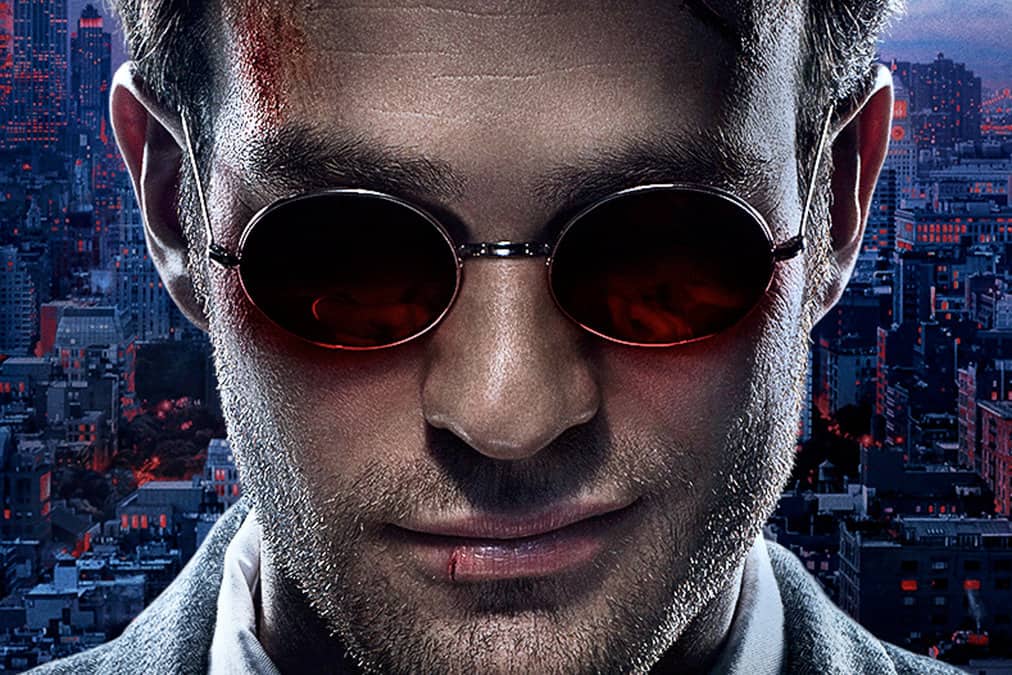An explosion. The collapse of a building. Death—but maybe not the end? Images rush across the screen of rubble, rushing water, and Daredevil (Matt Murdock) washing up on the shore. He crawls out of the water and lays there, beaten, bloody, and broken.
From here—in the context of pain, disaster, and a loss of meaning—the third season of Marvel’s Daredevil begins. The season is perhaps the best in terms of three, but what is so striking about Netflix’s recent addition to the storyline is how much it relates to the mystery of the Christian faith.
Daredevil closes Marvel’s Defenders (2017) by making the ultimate sacrifice in order to save the city, yet he survives. His shattered body and soul wash up on the shore of his own series, and soon he finds his way “back to the beginning.” While physically we see this in his rejection of the high-tech superhero suit, we also see this in his reappearance at the parish and orphanage where he was raised.
What follows is a man struggling with the tension between his faith and the presence of genuine evil in the world. It’s not a dissimilar experience to the everyday Christian struggle. The season is rich with conversations of faith—many occurring with positive representations of nuns and priests. These conversations are beautiful, pure, and quite frequently raw.
Matt Murdock (Daredevil) has faced his own powerlessness as a lawyer, so much so that he claims that Murdock is “dead” and only Daredevil remains. He believes that his work, his suffering, and even his sacrifice have resulted in nothing. Yet, in the midst of this he still recognizes the existence of a God. In a discussion with Sister Maggie, he even quotes from the Book of Job, though he uses the reference to define his new vision of an angry and uncaring God.
His life relies upon the exaggerated fiction of comic books wherein someone can survive a building collapsing on them. It mirrors a miracle, but it also demonstrates the complexity of the simultaneous presence of faith and suffering. But to Murdock, this miracle only proves God’s cruelty. Sister Maggie and Father Lantom hold on to hope, even allowing Murdock to grieve and insult them as he lashes out from his pain.
His pain seeks purpose, but instead of reaching out to friends and family, he commits himself to be the “devil of Hell’s Kitchen.” Murdock claims a total independence from God, seeking to lash out and punish rather than struggle with pain and evil’s presence in his world. Yet, as the season progresses, he finds more and more moments of joy and hope. In particular, his friends show him love and care, and they even forgive Matt Murdock of his callousness and disregard. It is as if God is slightly peeking through the veil of evil into his life.
Still, Murdock finds himself by the end of the season with a fundamental choice before him: to stand by his faith in God and the system, or to radically reject them both and kill the villain. It is that same tension in which we frequently exist. As Christians, do we stand by our faith despite the presence of such radical pain and suffering, or do we sacrifice our values to assume that nothing matters and there is no hope?
Matt Murdock has experienced a miracle, a rebirth, and simultaneously a crisis of faith. We are often faced simultaneously with miracles and pain, and we have to ask ourselves where we can hope to find the Resurrection in such challenging moments.
For Daredevil, his struggle brings him face to face with the real devil of the series (the villain Kingpin), but more importantly it brings him to a choice—a very fundamental question of faith: What will he allow to define him?
Murdock in a bloody, impassioned moment screams at Kingpin, “You… You want me to kill you. […] NO! God knows I want to, but you don’t get to destroy who I am.” It’s a brutal acceptance of faith. By choosing to remain Matt Murdock rather than just the devil of Hell’s Kitchen, he trusts that even though he cannot entirely see through the despair of the world, he can choose the way he engages with the world. He chooses to allow his faith and his values to remain.
For all of its superhero wonder, the series asks the same question of the audience: What will we allow to define us—our despair or our faith?
//
Cover image used courtesy of FlickrCC user BagoGames.


